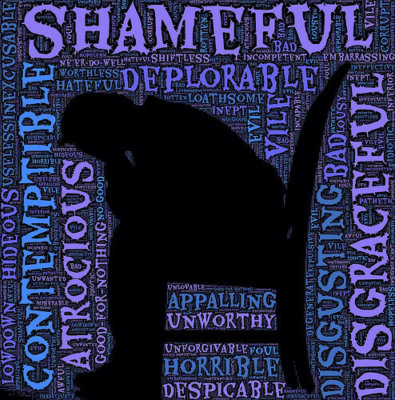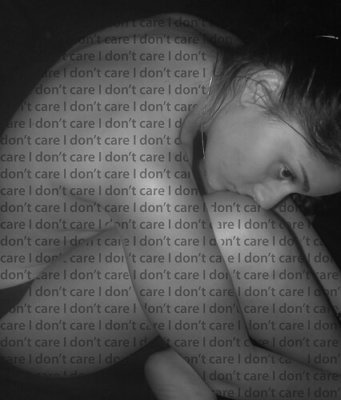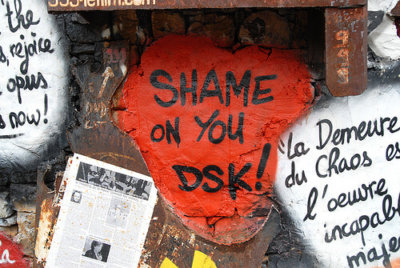Shame – is This Emotion Secretly Ruling Your Life?

By: John Hain
Shame is a word we attribute with many meanings. We say we ‘feel ashamed’ if we mess up at work, or disappoint a partner. Or ‘don’t shame me’ if someone is putting us down.
The examples above really talk about guilt – – our awareness that our actions have upset others. Shame might be triggered by a poor choice of actions or by your guilt, but it doesn’t depend on them.
So how, then, can we define shame?
Shame is a painful, deeply negative, and always present (if sometimes denied) feeling you have about yourself and your worth. At its strongest, shame leaves you feeling that you are damaged and faulty beyond repair, and will never be as good as those around you. Perhaps the biggest of all emotions, shame is often the real ‘master emotion’ hidden behind and supporting other ones like sadness and anger.
How do I know if I am secretly suffering from shame?
You might manifest shame in ways like the following:
- When things upset you you feel a strong urge to hide or disappear
- You focus on not making mistakes or doing things that upset others
- If people criticise you, you get very offended (you’ve been accused of overreacting)
- You secretly worry nobody would like you if they knew the ‘real you’
- You hide things about yourself or have different selves around different people
- You might be an overachiever or perfectionist but never feel quite good enough
- You have secrets thoughts that you are a terrible person
- When you get down or depressed you might have thoughts it would be easier to die

By: Valeria P.
But if you are very out of touch with your feelings and thoughts, you might have a problem with shame that shows itself in different forms of self-protection, like-
- being very defensive “that is not what I was asked to do, how was I to know”
- blaming others all the time
- claiming you don’t care about anything
- deciding you are above normal emotions and problems
- minimising other’s reactions to you (“I don’t know why you are making such a big deal of this”)
Why do I feel so much shame?
Deep shame, often referred to as ‘core shame’, stems from very difficult experiences that knock your sense of worth to the extent that you are left feeling damaged beyond repair.
Most often the experiences leading to a shame-based personality stem from childhood trauma, such as –
- a parent or caregiver who constantly criticised you
- being neglected or abandoned, including emotional neglect
- being unduly or severely punished
- an alcoholic or addict parent
- the death of a sibling when young
- an environment of religious fanaticism
- physical abuse
Shame is also often connected to sexual experiences when young. This can either be a history of engaging in sexual activity from an early age before you had real confidence or a sense of self, or it can be that you suffered sexual abuse.
Shame can also develop later in life if a trauma occurs that deeply threatens your sense of self. This includes things being the victim of a crime or assault, or an accident that you feel responsible for.
Dealing With Shame – How Is It Running Your Life?
By: thierry ehrmann
Shame tends to act like a coloured pair of glasses you see the entire world with and can’t take off (but they aren’t rose coloured, sadly).
In your career, shame can either affect your progress or leave you highly stressed. A small criticism from a superior about a presentation can become something you lose sleep over, a joke about your desk upkeep can leave you feeling unable to connect with colleagues.
And shame often leaves you with low self-esteem, meaning either you don’t try for the jobs you are actually capable of, or you overwork to prove yourself, meaning that the rest of your life lacks balance and you have perfectionist tendencies.
Shame can also mean you never let yourself do well, which goes against your hidden core belief you are unworthy and flawed. The result is a problem with procrastination and a marked inability to achieve the goals you set.
In relationships, shame is a sabotaging force. Some people with deep shame issues find they have a fear of intimacy. So they jump from one relationship to the next, or stay in one relationship but with an exhausting pattern of ‘push pull’. In some cases, shame can lead you to stay in codependent or even abusive relationships, confirming your shameful notion you are not worthy of good things such as love. Shame can also cause sexual issues.
Socially, you may find you struggle to be fully yourself, always acting happier than you are, or that you have constant conflict with others that comes from your shame-driven tendency to be defensive. Again, shame can lead to friendships with people who don’t acknowledge you or treat you well, or relationships where you feed into others needs and avoid your own.
Shame and related psychological disorders

By: Grey World
Shame can mean you suffer negative thinking that leaves you suffering depression and anxiety.
You might try to hide from such negative thoughts and feelings about yourself by using addictive behaviour, such as alcoholism or drug abuse, sexual addition, or overeating.
Or, your shame may lead you want to hurt yourself, which can manifest as self-harming or an eating disorder.
For some people, repressed shame ends up erupting into anger management issues, road rage, or even domestic violence towards others.
Shame has also been linked to the personality trait of narcissism. In some cases if shame is severe enough that an individual feels driven to hide their perceived ‘weak’ self, narcissistic personality disorder can develop, meaning that grandiosity and power are used to hide the shameful self.
What can I do if I suffer from shame?
Chronic shame, as discussed, has its roots in difficult childhood experiences that left you with damaging core beliefs about your own worth.
So unless those experiences are recognised and processed, it’s pretty impossible to just ‘get rid of’ your feelings of shame and inadequacy and all the behaviours they bring.
This is where psychotherapy steps in. Psychological talking therapies are designed with the very goal of helping you uncover the past experiences that have informed how you feel about yourself in the present.
A good counsellor or psychotherapist can help you to:
- identify just what happened that created your shameful feelings
- help you process the repressed emotions and hurt from your experiences
- gain a more objective perspective of what happened
- stop blaming yourself for things beyond your control
- see yourself and your life from a new and more empowering perspective
- you to find new ways of building your esteem
- make choices for your future from a place of worth over shame
Do you have a question about shame we haven’t answered? Ask below, we love hearing from you.






It was great to read your blog post after publishing my own on shame a couple of weeks ago http://thebridgecounsellingservice.co.uk/ipswich-counselling-blog-how-to-deal-with-shame/. Shame is such a painful emotion and your article really breaks the emotion down into specifics. As you recommend, counselling can be so helpful in recognising shame because it’s not always easy to pin down is it? Shame struggles to survive in the presence of empathy and if we can turn that into self-empathy then together with counselling we have two powerful ways to deal with shame.
I am at the end of my second year of studying for a Diploma in Psychotherapy. I think that skills practice triggers my own shame, in that when I feel empathy, this brings up my own felt memories of childhood abuse and neglect. I have always felt I had an aptitude for counselling and this is why I have embarked on this course, but the feelings being triggered as a counsellor sometimes feel quite overwhelming. I am seeing a therapist myself whilst I do this course, but I finding my intense feelings still feel quite a problem in continuing this work. I have the option of deferring my studies for a year. i do think becoming a counsellor can be a way of seeking affirmation from clients, feeling valued, and also can be a way of avoiding my own needs. What is your view on my predicament, and how would you work with such a realisation? Would you recommend that I defer my course and meanwhile seek to get these issues of shame addressed so that I have more clarity of being for future clients under my care?
…..further to this post, I want to add that at the present time, case studies are about to be written up and completed, and I am in the process of securing a placement. It is a crucial point in the process of becoming a counsellor, but at the same time, it seems like an appropriate point to defer if that is the decision…
Hi Jane, we really can’t tell you what choices to make about your life over the internet and not knowing you well. You will have to trust your own wisdom and the best person to talk to about this would be your counsellor. Many students who embark on psychotherapy and counselling courses because of a desire to help others find that actually it is themselves they need to help. The courses become a process of healing the self. This is why a large percentage take a lot longer to finish the courses, or decide to not work as a therapist in the end. It’s absolutely normal to be feeling all these things. It’s an intense process and all things rise to the surface! And the fact that you are so clear on what is going on and are taking it seriously shows you do have what it takes to be a therapist as you are aware and concerned. Note that even when we are working as therapists, the challenge never ends. You might want to read about ‘countertransference’ which is the name given to a therapist reacting to clients. In summary, there is no ticking clock for finishing counselling training. Many people end up spacing it out for several years extra. Do what feels right to you and your process, and try not to compare yourself to other students. It’s your journey. If you want to be a therapist, you will find your way there at the pace and process that is right for you. Hope that helps.
Again Jane, you have to trust your self here. We’d ask good questions, like, is this a pattern for you? Do you constantly get close to things, overthink, and stop/back out? Or is this really because you are just overwhelmed and need time out?
Wow, a lot of my experience of life can relate to this article. Eye opener,thank you.
Glad it was helpful Andrew.
Hi is there therapists you would recommend that are known to work with toxic shame?
Hi Sara, ‘toxic shame’ could you say more? All therapists work with shame. Many of us have shame, it’s the main emotion tethering all other emotions and driving us to try therapy. So it’s a bit broad. Is it shame from trauma or abuse? Or shame from parenting where you didn’t feel loved? Or shame from a recent experience? Otherwise, rest assured all therapists can navigate shame, and find a therapist you feel comfortable with. Best, HT.
Yes! I have been both sexually abused, physically and parents who’s main form of abuse was ridicule and shaming. In result I have had recent experiences as well I think my belief in that I’m inherently flawed brings relationships and people who treat me the same as when I was a child. So it’s toxic in the sense that it’s always present. I don’t feel like I have a solid identity and always end up in codependent relationships (my relationships with my family is very much codependent even if better than when I was a child). I would say I’m so afraid of making mistakes that I don’t do much with my life and when I do I always end up in shame and regret. I see myself in everything on this article but what was new to me was “ deciding you are above normal emotions and problems” which I do constantly as avoidance. I need to get in touch with my emotions since I’ve been out of touch for a long time.
Hope this was helpful in trying to narrow it down!
Hi Sara, yes this is very helpful. It’s very common if we grew up with parents who didn’t unconditionally love us no matter what to end up with identity issues. We spend our childhood trying to please and by the time we are an adult have repressed our true selves so long we never know what we actually think of feel. CBT is a short term therapy that can be a good place to start and get stabilised, it isn’t about diving into your past but about learning how to manage your self defeating thoughts and stop mood spirals. Then you might want to try trauma-based therapies like schema therapy, read our article on the various therapies recommended for trauma here http://bit.ly/therapyfortrauma. Best, HT.
I am really very thankful to Harley Therapy.
I’m a 30 year old male from india.
I have been carrying shame trauma since my childhood and still not been able to overcome it.. I believe childhood trauma can never be healed..you always keep on going into it again and again to better understand it and make peace with it..
This post regarding shame is really very easy to understand…
Thanks you.
I came across this page looking for information on defensiveness. I ended seeing Righteous indignation as a form of it, searched it up, ended up here.
After reading the replies above, I’m curious if there is a specialty in shame. About 6m ago I learned what I thought was shame is not what I thought, realized I carry a large amount of it, and I feel like I can’t really get a grasp on it in it’s true form. It’s more today yes this fits, tomorrow it doesn’t, and next week I check off 4/6 rather than 1/6.
My shame is pretty complex I think; not more than another person but not your average. I have unresolved childhood sexual abuse, divorced parents, abandonment issues, defensiveness (which I do know I exhibit it but I’m not sure if it’s an actual issue or just caused by a toxic situation), perfectionism, ADHD, fearful avoidant attachment, codependency… The list goes on.
I’ve been looking to try EMDR but I don’t think it’ll help. Like I DO think it will help but it’s not the type of help I’m looking for.
Wow jfc I’m sending this in anyway cause sheesh the amount of time I’ve spent pouring out my thoughts in search of help.
Columbus Ohio location, can you please suggest a type of therapist, a place, a method — I’ve done cbt on my own. It’s incredible but I can’t get it to work here. I don’t feel bad, I just feel unresolved. Like an open crime scene.
Thanks. Sorry.